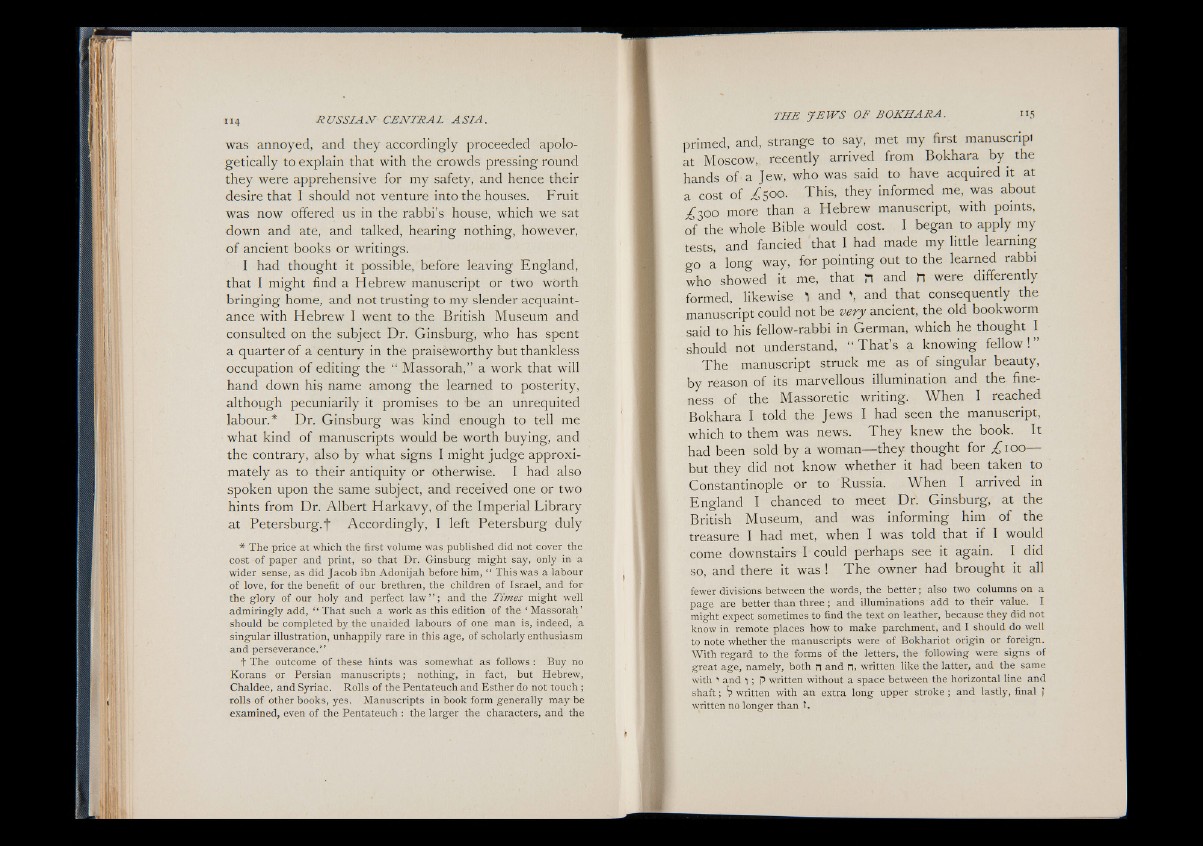
was annoyed, and they accordingly proceeded apologetically
to explain that with the crowds pressing round
they were apprehensive for my safety, and hence their
desire that I should not venture into the houses. Fruit
was now offered us in the rabbi’s house, which we sat
down and ate, and talked, hearing nothing, however,
o f ancient books or writings.
I had thought it possible, before leaving England,
that I might find a Hebrew manuscript or two worth
bringing home, and not trusting to my slender acquaintance
with Hebrew I went to the British Museum and
consulted on the subject Dr. Ginsburg, who has spent
a quarter of a century in the praiseworthy but thankless
occupation of editing the “ Massorah,” a work that will
hand down his name among the learned to posterity,
although pecuniarily it promises to be an unrequited
labour.* Dr. Ginsburg was kind enough to tell me
what kind of manuscripts would be worth buying, and
the contrary, also by what signs I might judge approximately
as to their antiquity or otherwise. I had also
spoken upon the same subject, and received one or two
hints from Dr. Albert Harkavy, of the Imperial Library
at Petersburg, f Accordingly, I left Petersburg duly
* The price at which the first volume was published did not cover the
cost -of paper and print, so that Dr. Ginsburg might say, only in a
wider sense, as did Jacob ibn Adonijah before him, “ This was a labour
of love, for the benefit of our brethren, the children of Israel, and for
the glory of our holy and perfect law” ; and the Times might well
admiringly add, “ That such a work as this edition of the ‘Massorah’
should be completed by the unaided labours of one man is, indeed, a
singular illustration, unhappily rare in this age, of scholarly enthusiasm
and perseverance.”
f The outcome of these hints was somewhat as follows : Buy no
Korans or Persian manuscripts; nothing, in fact, but Hebrew,
Chaldee, and Syriac. Rolls of the Pentateuch and Esther do not touch ;
rolls of other books, yes. Manuscripts in book form generally may be
examined, even of the Pentateuch : the larger the characters, and the
primed, and, strange to say, met my first manuscripl
at Moscow,, recently arrived from Bokhara by the
hands of a Jew, who was said to have acquired it at
a cost of ^500. This, they informed me, was about
/300 more than a Hebrew manuscript, with points,
of the whole Bible would cost. I began to apply my
tests, and fancied that I had made my little learning
go a long way, for pointing out to the learned rabbi
who showed it me, that n and n were differently
formed, likewise 1 and \ and that consequently the
manuscript could not be very ancient, the old bookworm
said to his fellow-rabbi in German, which he thought I
should not understand, “ That’s a knowing fellow ! ”
The manuscript struck me as of singular beauty,
by reason of its marvellous illumination and the fineness
of the Massoretic writing. When I reached
Bokhara I told the Jews I had seen the manuscript,
which to them was news. T hey knew the book. It
had been sold by a woman— they thought for ¿ 10 0—
but they did not know whether it had been taken to
Constantinople or to Russia. When I arrived in
England I chanced to meet Dr. Ginsburg, at the
British Museum, and was informing him of the
treasure I had met, when I was told that if I would
come downstairs I could perhaps see it again. I did
so, and there it was ! T he owner had brought it all
fewer divisions between the words, the better; also two columns on a
page are better than three ; and illuminations add to their value. I
might expect sometimes to find the text on leather, because they did not
know in remote places how to make parchment, and I should do well
to note whether the manuscripts were of Bokhariot origin or foreign.
With regard to the forms of the letters, the following were signs of
great age, namely, both n and n, written like the latter, and the same
with ' and 1 ; p written without a space between the horizontal line and
shaft; ? written with an extra long upper stroke ; and lastly, final i
written no longer than 1.